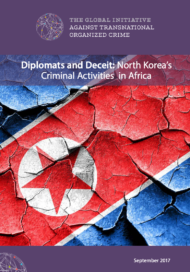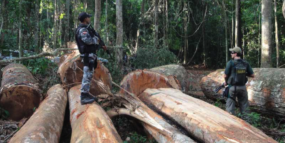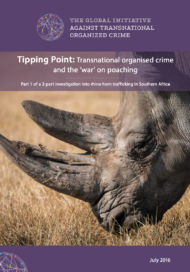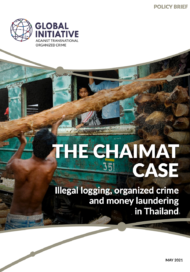Posted on 17 Jun 2014
Organized Environmental Crime: A Call to Action
Unchecked corruption and sophisticated criminal networks have created an illicit economy in environmental products, which is pushing species to the brink of extinction, transforming thriving rainforests into impoverished wastelands and polluting the environment with toxic waste.
Against this backdrop, the Global Initiative against Transnational Organized Crime has developed a baseline assessment of organized environmental crime. This report is the culmination of consultations with over 150 environmental, development and criminal justice experts across the globe, and highlights the virulent threat that organized crime poses to the environment, and how poorly prepared we are to respond to this exponentially growing challenge.
Environmental crime is one of the most damaging, high profile and economically-significant fields of global criminal activity. Many crimes are still beyond our capacity to assess, but the report discloses some alarming statistics: the value of wildlife trade is an estimated US$19 billion a year, with a single rhinoceros horn netting $260,000 for criminal groups, for example. The value of illegal fishing is estimated at US$23 billion per year, and is forecast to trigger a complete collapse of the world’s fish stocks by 2048. Deforestation in the Amazon region increased up to 103% in 2012-2013, with estimated profits of US$100 billion for the illegal timber industry worldwide. In the Asia-Pacific region, some 80% of lumber is thought to be illicitly sourced.
But the direct financial cost is not the biggest concern: loss of biodiversity and species through illegal trade also impacts upon human livelihoods. It affects hunting for food and destroys opportunities for communities to benefit from industries such as tourism, for example.
Across their various disciplines and areas of expertise, the experts involved in this study wished to communicate five key messages:
1. “Recognize the role of organized crime: Act now, different, better…”
2. “Corruption is the elephant in the room and we don’t say it enough”
3. “Capture the controllers, not the army of ants…”
4. “Draw on non-state resources and work better together”
5. “Unless we act now, we will lose…”
These are surprisingly consistent and universal messages, and serve as an imperative to the international community, national governments and individual citizens to recognize that this no longer as an environmental issue, but a criminal issue, and to use all of the tools at their disposal to respond urgently and coherently.
Environmental crime is time critical, and the tipping point is fast approaching where the damage to the environment and key species can no longer be reversed.
Read the Key Messages and Core Recommendations here:
Global Initiative – Organized Environmental Crime: Key Messages and Core Recommendations (June 2014)
Download a copy of our Infographic here:
Global Initiative – Environmental Crime Infographic (June 2014)
Read the full Baseline Assessment of Organized Environmental Crime here…
Global Initiative – Global Response to Transnational Organized Environmental Crime (January 2014)




